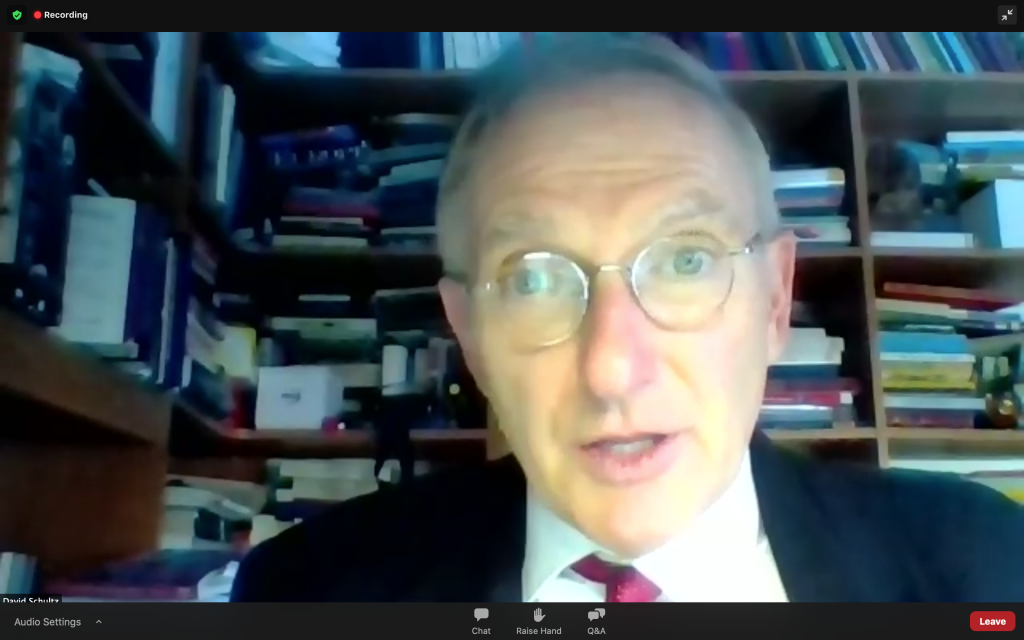With less than six days remaining until the 2020 general election, Binghamton University held a talk with alumnus David Schultz, ‘80, M.A. ‘86, on the importance of voting.
The talk was sponsored by Harpur Edge, Harpur College of Arts and Sciences, the College of Community and Public Affairs (CCPA) and the Institute for Justice and Well-Being (IJWB). The event focused on the origins of the Electoral College, how it functions and the effectiveness of its modern use.
Schultz, a professor of political science at Hamline University and professor of law at the University of Minnesota, said he decided to hold the talk with BU students to provide a perspective on the Electoral College. Schultz said that many students do not properly understand the inner workings of the electoral system.
“The Electoral College is one of the most misunderstood institutions in American politics,” Schultz wrote in an email. “It is the institution and not the popular vote that actually elects the president of the United States. I [wanted] to do this before the election so students have a better idea of how the president is elected and to determine whether their vote matters in the 2020 election.”
Throughout the talk, Schultz discussed the creation of the Electoral College, including a historical look on the debates that were held among constitutional framers over how a president should be elected, the effectiveness of the system and how it disenfranchises voters.
“The idea that a president can be selected by the people was rejected by the framers [of the Constitution],” Schultz said. “One of the ideas was that states, directly through their state legislatures, would pick the president. That was also rejected.”
Schultz referenced the 2000 presidential election, between Republican president George W. Bush and Democratic nominee Al Gore, as an example of how the Electoral College alters people’s voting choices.
“There is still no individual right for citizens to [directly] vote for president,” Schultz said. “We were reminded of this in 2000, during the Bush vs. Gore election. There is evidence that the Electoral College discourages people from voting third party. Many Democrats blamed people for voting for [Green Party nominee] Ralph Nader. They say that had people not done that, Al Gore would’ve won.”
The talk also included a discussion of some of the ongoing issues with the creation of the Electoral College, which Schultz referred to as the “swing-state phenomenon.”
“I knew 43 states were noncompetitive,” Schultz said. “This is part of the swing-states phenomenon, which gives a disproportionate amount of influence to the swing states.”
Schultz also suggested that it is unlikely the Electoral College will be abolished in the near future given the current polarized political climate.
“To get rid of the Electoral College, we need a constitutional amendment,” Schultz said. “We are probably in such a polarized environment right now that we can’t get two-thirds of both the [House of Representatives] and [the] Senate to agree on the change. I doubt we’re going to get that change to happen.”
Erin Cody, director of Harpur Edge, said BU brought in Schultz for the talk because of his experience and extensive knowledge of American politics, especially during a period in which there is an anticipated increase in civic engagement among students.
“In preparing for our programming for fall 2020, we anticipated a heightened interest by students in the upcoming presidential election,” Cody wrote in an email. “In reviewing [Schultz’s] credentials, as the author of 30 books and 100+ articles on various aspects of American politics, election law and the media and politics, as well as his regular interviews in the national and international media on these subjects, we were eager to offer an opportunity for students to connect with this alumnus at a time when some might be facing the first presidential election they can vote in.”
Cody later expressed that regardless of the election outcome, students should still participate in political affairs.
“If the election doesn’t go in the direction you are hoping, get more involved,” Cody wrote. “If it does, get more involved. An election shines a light on what matters to each of us as we examine our choices.”
Laura Bronstein, dean of CCPA and the IJWB, described the importance of BU holding the event given the country’s current political environment and emphasized the importance of students educating themselves on the Electoral College.
“Especially during the divisive political environment we are in today, it is important for all of us to educate ourselves about how the political system and our elections work,” Bronstein wrote in an email. “I hope those that learn about the Electoral College and its pros and cons will be better able to advocate for the best system to elect our nation’s leaders. I [also] hope that student civic engagement will be enhanced by the election and continue to expand. We need our students to help build a better world for all.”
Rebecca Colao, a senior double-majoring in French and art and design, attended the talk. Colao said the Electoral College is flawed, seeking to learn more about its history through the talk.
“I felt like the Electoral College was a flawed system, but I didn’t know much about its history or why it was still in place,” Colao said. “I think it’s a system that is not compatible with our current political climate and does not function under the polarization of our country today and should be reformed. There are valid concerns about moving to a purely popular vote system. However, I’m not sure what the best alternative to the Electoral College would look like, but maybe one day things will be different.”



